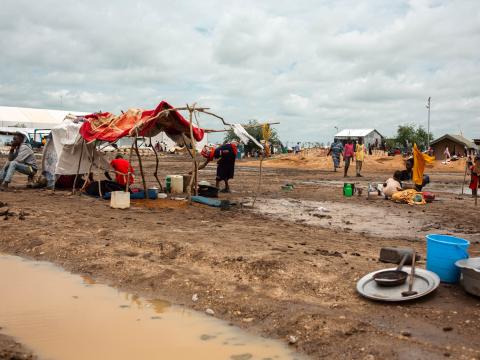Cholera outbreak in South Sudan nears breaking point; children’s lives and displaced population at grave risk

Juba, South Sudan – 20 August 2025. South Sudan’s cholera outbreak is reaching a critical level, now affecting more than 40,000 children—including 20,000 under the age of five—and placing millions more at serious risk. With more than 88,000 cases and 1,500 deaths already reported, the outbreak is accelerating at an alarming rate. World Vision is deeply concerned about the deadly disease spreading across the country. The crisis is especially severe for children, who are trapped in a dangerous mix of disease, hunger, and displacement.
Although the Government of South Sudan has not officially declared a national emergency, humanitarian access remains challenging in several areas of the country. A communiqué issued by the Extraordinary Inter-Ministerial Meeting on Cholera warns that the situation is reaching a critical stage. “This is not merely a public health crisis, but a multi-sectoral emergency, exacerbated by flooding, displacement, and limited access to basic services,” the statement noted.
The outbreak began in late 2024 and has worsened during the current rainy season, now affecting 55 out of 79 counties. The hardest-hit areas include Central Equatoria, Upper Nile, Warrap, Jonglei, and Unity states. Children living in overcrowded displacement camps, informal settlements, and flood-affected areas are most at risk. UNICEF, in March, reported that a third of the deaths are children under the age of 14. In conflict zones like Aweil, Renk, Ulang, and Nasir, limited access and poor disease monitoring mean the true scale of the crisis may be even greater than reported.
“This is an extremely dangerous situation for children,” said Mesfin Loha, Country Director of World Vision South Sudan. “Cholera is taking young lives, while hunger is weakening children’s bodies and making them more vulnerable. Without clean water, food, and basic medical care, children are dying from preventable causes. We’re deeply concerned about what lies ahead.”
The crisis is being made worse by extreme food shortages. Field assessments and the latest IPC report warn that catastrophic-level conditions are emerging in Nasir and Ulang counties. Children under five in these areas are showing alarming levels of malnutrition, and the number of deaths is expected to rise in October. At the same time, these communities are also battling severe cholera outbreaks—creating a deadly combination of threats.
World Vision South Sudan warns that funding cuts are stripping away essential services. “Reductions in food aid and water, sanitation, and hygiene (WASH) programmes are leaving children even more vulnerable. Malnourished children are unable to fight infections like cholera, and the lack of clean water is fueling the disease's spread,” said Loha.
Despite limited resources, World Vision South Sudan has initiated a response to the cholera outbreak. “We have developed a six-month emergency response aimed at reaching 500,000 people in the most affected areas. Through World Vision’s Nexus Accelerator Fund, we are able to start delivering urgent health, WASH support, as well as case management, advocacy and risk communications. However, this effort remains dangerously underfunded,” he added.
An urgent appeal for an additional US$500,000 has been launched to scale up the response. This funding would enable World Vision to expand WASH services, strengthen local healthcare systems, provide food assistance and child protection, and advocate for the safety and survival of South Sudan’s most vulnerable children.
World Vision is calling on donors, governments, and humanitarian partners to act now, before it’s too late.
Millions of children's lives hang in the balance.
Swift, decisive action is not just urgent; it’s a moral imperative. Every moment we wait is a moment lost in the fight to save them. We must act for humanity!
For media enquiries or to support the response, please contact:
Diwa Gacosta
Advocacy and Communications Lead, World Vision South Sudan
Email: diwa_aquino-gacosta@wvi.org